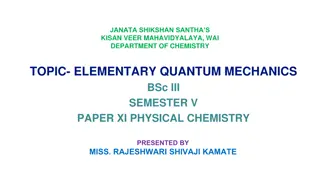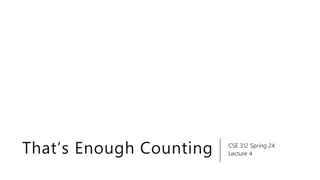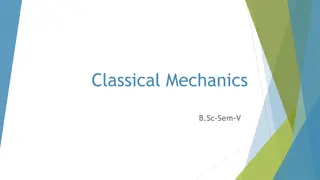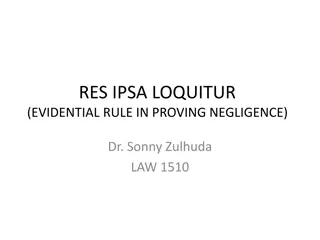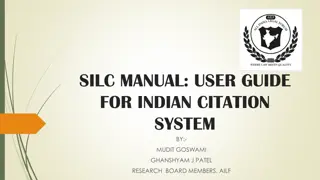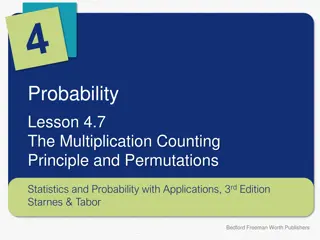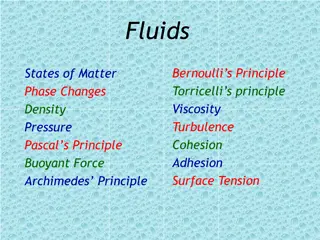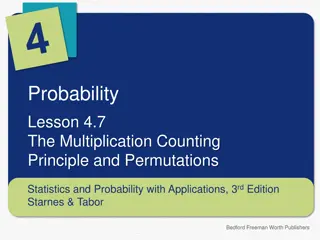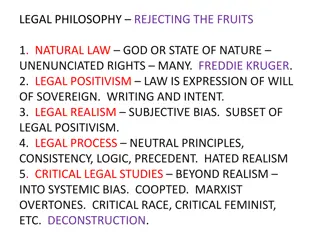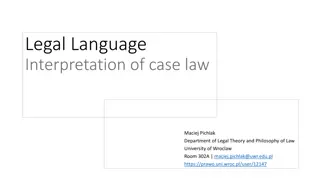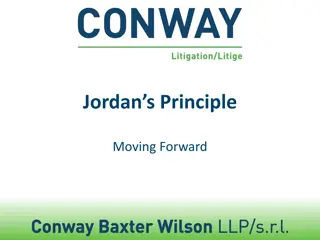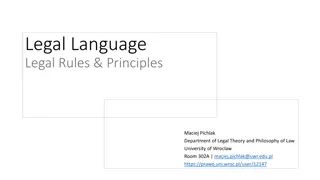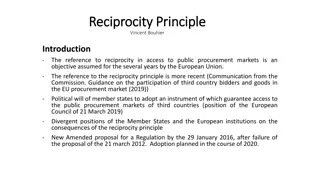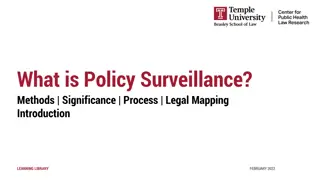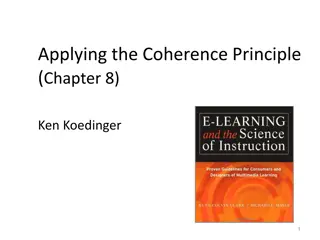Legal Aid to Protect the Right to Legal Identity in Humanitarian Settings
Explore the importance of legal aid in safeguarding legal identity rights for displaced populations through case studies and discussions in humanitarian contexts. Learn about coordination efforts, partnerships with national actors, and good practices in legal documentation programs, such as the UNHC
1 views • 8 slides
Heisenberg's Uncertainty Principle in Elementary Quantum Mechanics
Heisenberg's Uncertainty Principle, proposed by German scientist Werner Heisenberg in 1927, states the impossibility of simultaneously and accurately determining the position and momentum of microscopic particles like electrons. This principle challenges classical concepts of definite position and m
0 views • 49 slides
Counting Principles and Pigeonhole Principle Explained
Explore the concepts of counting principles and the pigeonhole principle through practical examples and tips. Learn how to apply these principles to solve problems effectively. From understanding basic counting rules to the advanced pigeonhole principle, this content provides insights and guidance o
0 views • 35 slides
Legal Staffing with LDM Global_ Your Partner in Legal Excellence
In today's fast-paced legal environment, having the right team in place is crucial for law firms and legal departments to deliver outstanding services and maintain competitive advantage. At LDM Global, we understand the challenges that legal organizations face and are dedicated to providing top-notc
1 views • 12 slides
Understanding the Difference Between Legal Information and Legal Advice
Legal information provides facts about the law and legal processes, while legal advice offers guidance on courses of action to further interests. Legal information is like the rules of a game, explaining basics, while legal advice is akin to the strategies for winning. This article explores the dist
0 views • 12 slides
Understanding Classical Mechanics: Variational Principle and Applications
Classical Mechanics explores the Variational Principle in the calculus of variations, offering a method to determine maximum values of quantities dependent on functions. This principle, rooted in the wave function, aids in finding parameter values such as expectation values independently of the coor
0 views • 16 slides
Role and Responsibility of Legal Aid Panel Lawyers by Rajasthan State Legal Services Authority
Legal aid panel lawyers play a crucial role in providing competent legal services to the marginalized sections of society, spreading legal awareness, and ensuring access to justice. Their responsibilities include representing clients in court, acting as mentors, and upholding ethical standards in le
2 views • 22 slides
Understanding Le Chatelier's Principle in Chemical Equilibrium
Le Chatelier's Principle states that when a system at equilibrium is disturbed by changes in concentration, temperature, or pressure, the equilibrium shifts to counteract the change. This principle can be applied to predict the direction of equilibrium when changes occur. Changes in concentration, p
0 views • 10 slides
Understanding Res Ipsa Loquitur in Proving Negligence
Res Ipsa Loquitur is a legal principle where the occurrence of an accident implies negligence on the part of the defendant. It shifts the burden of proof to the defendant, requiring them to explain the incident's cause. Originating from the Scott v London case in 1865, this principle has been applie
6 views • 19 slides
Standard Indian Legal Citation (SILC): User Guide and Overview
Standard Indian Legal Citation (SILC) is a unique reference framework designed to cater to India's legal community by incorporating the rich legal traditions and history of the country. Led by prominent legal professionals, SILC aims to establish a standardized citation system specific to India. The
2 views • 27 slides
Understanding the Multiplication Counting Principle in Probability
The Multiplication Counting Principle and Permutations play a crucial role in determining the number of possible outcomes in various processes. This lesson covers how to use factorials to count permutations, compute arrangements of individuals, and apply the multiplication counting principle to dete
0 views • 14 slides
Akhan Legal - Your Path to Justice in Ottawa
Akhan Legal, founded in 2014 by Afshan Khan, is a client-focused paralegal firm in Ottawa specializing in immigration and refugee legal matters. With a mission to provide efficient and affordable legal services, Akhan Legal is dedicated to building lasting partnerships with its diverse clientele. Ms
0 views • 16 slides
Understanding Jordan's Principle and Its Impact on First Nations and Inuit Children in Canada
Jordan's Principle was named in memory of Jordan River Anderson, a young boy whose tragic story led to the establishment of a legal requirement ensuring access to services for First Nations and Inuit children in Canada without delays or disruptions. This principle aims to prevent situations where ch
0 views • 9 slides
Role and Responsibility of Legal Aid Panel Lawyers Presentation
The presentation by Rajasthan State Legal Services Authority discusses the vital role of legal aid panel lawyers in providing legal services to the marginalized and weaker sections of society. It emphasizes the responsibilities of panel lawyers in offering competent legal assistance, spreading legal
0 views • 22 slides
Essential Elements of a Tort in Indian Law
The essential elements of a tort under Indian law include a wrongful act, legal damage, and legal remedy. A wrongful act is one that violates another's legal rights, while legal damage refers to harm caused by the wrongful act. The concept of "damnum sine injuria" is also crucial in determining lega
0 views • 7 slides
Enhancing Quality Standards of Legal Clinical Education in Ukraine
The Association of Legal Clinics of Ukraine (ALCU) is dedicated to promoting high-quality legal clinical education in the country. They have established standards and assessment tools to ensure the effectiveness of legal clinics, with a focus on providing free legal aid and raising legal awareness.
1 views • 10 slides
Understanding Fluids, States of Matter, and Phase Changes
Exploring key concepts in physics including Bernoulli's Principle, viscosity, cohesion, states of matter (solid, liquid, gas, plasma), phase changes (evaporation, condensation, etc.), density, pressure, and more. Discover the properties and behaviors of fluids in relation to gases and liquids, along
1 views • 54 slides
Understanding the Acceleration of the Universe and the Equivalence Principle Violation in the Horndeski Vector-Tensor Theory
Exploring the implications of the Equivalence Principle Violation after reheating in the context of the accelerated expansion of the universe. The study delves into the Horndeski vector-tensor theory, gravitational waves, and the impact of modified gravity and dark energy. Insights are provided on t
2 views • 20 slides
Access to Justice Through Public Legal Education in Alberta
The Centre for Public Legal Education Alberta (CPLEA) is a not-for-profit organization offering plain language legal education and information to empower individuals in understanding their rights and responsibilities. Public Legal Education (PLE) helps people address legal issues independently by pr
0 views • 20 slides
The Multiplication Counting Principle in Probability: Exploring Permutations
Exploring the multiplication counting principle in probability, this lesson delves into determining the number of ways to complete a process involving multiple steps. Using factorials for permutations, the content showcases how to compute permutations of individuals taken at a time. Through examples
0 views • 20 slides
Understanding Hardy-Weinberg Principle and Genetic Frequencies
Gene pool and allele frequencies play a crucial role in the Hardy-Weinberg Principle, a mathematical model predicting allele frequencies over generations. The principle outlines conditions like a large population, absence of mutations, random mating, and more. Equations such as p² + 2pq + q² = 1 h
0 views • 44 slides
Understanding Legal Philosophy: Rejection of Traditional Frameworks
Explore various schools of legal philosophy such as natural law, legal positivism, legal realism, legal process, and critical legal studies. Discover the evolution of civil rights through key amendments and landmark cases shaping modern legal interpretations.
0 views • 194 slides
Understanding Legal Aid and Access to Justice
Legal aid is a state-funded support system aimed at providing legal assistance to individuals who cannot afford legal help. However, the availability of legal aid has been significantly impacted over the years by various acts and changes in the legal system. The unmet need for legal services arises
0 views • 22 slides
Understanding Binding Precedent in Legal Interpretation
The concept of binding precedent, also known as stare decisis, plays a crucial role in legal decision-making across different legal systems. This principle ensures that lower courts are bound by the decisions of higher courts, while also allowing for exceptions under specific circumstances. Key case
0 views • 8 slides
Legal Aid Provision and Access: Challenges and Solutions
Rebecca Rayment, a former Legal Aid lawyer and current Chief Executive of Manuel Bravo Project, addresses the complexities of accessing legal assistance, specifically focusing on Legal Aid for vulnerable asylum seekers and migrants. The presentation delves into the current legal advice provision, ch
0 views • 15 slides
Principle of Majority Rule in Company Law
The principle of majority rule is a fundamental aspect of company law, where the powers of control over a company rest with the general meeting representing the majority shareholders. This principle emphasizes that decisions are made by a simple or special majority vote, except for powers vested in
0 views • 9 slides
Proportionality as Core Principle in Supervising Heterogeneous Banking Sectors: Lessons from Germany
The supervision of a diverse banking sector, such as Germany's with roughly 2,000 banks, is based on the core principle of proportionality. This approach involves tailoring regulations and oversight to fit the individual characteristics of each institution, focusing on qualitative aspects, organizat
0 views • 8 slides
Understanding Legal Reasoning: A Comprehensive Insight
Legal reasoning involves navigating through gaps, inconsistencies, and ambiguities in the law to interpret and apply legal norms effectively. This process of validation, interpretation, and application helps legal practitioners optimize the legal system and adapt it to real-life cases. The presentat
0 views • 21 slides
Iowa Legal Aid: Free Legal Assistance for Low-Income Iowans
Iowa Legal Aid offers free legal assistance to low-income Iowans, covering a range of civil legal issues such as family law, housing, consumer rights, and more. Services are provided through regional offices across Iowa, with easy application processes and multilingual support available. Learn how t
1 views • 26 slides
Understanding the Finnish Legal Profession of Attorneys-at-law
Attorneys-at-law in Finland are highly trained legal professionals who play a crucial role in upholding the rule of law. Only members of the Bar Association can hold this title, ensuring quality legal services for clients. The profession includes different roles such as licensed legal counsel, publi
0 views • 16 slides
Jordan's Principle: Advocating for First Nations Children's Rights
Jordan's Principle is a vital advocacy tool aimed at ensuring equitable access to necessary services for First Nations children, emphasizing prompt resolution of jurisdictional disputes. Originating from the story of Jordan River Anderson, its implementation has faced challenges and legal battles. C
0 views • 21 slides
Evolution of Legal Aid: From Inception to Present Challenges
The evolution of legal aid from its establishment in 1949 to the current challenges faced post the Legal Aid, Sentencing and Punishment of Offenders Act 2012 has been marked by changes in funding, administration, and accessibility. Despite initial state-funded schemes and subsequent reforms, recent
0 views • 24 slides
Legal Language, Rules, and Principles: Understanding Norm Structures and Legal Personhood
Explore the structure of legal norms, including their components - hypothesis and disposition. Learn about the addressee of norms, legal personhood, and legal capacity. Discover how in New Zealand, land and rivers have been granted personhood, akin to corporations, in legal terms. Dive into a case s
0 views • 20 slides
Legal Aid Board and Abhaile: Providing Legal Assistance to Those in Need
Legal Aid Board offers civil legal aid and advice to individuals with insufficient means, following the Civil Legal Aid Regulations. Abhaile provides financial and legal guidance to insolvent individuals at risk of losing their homes. The solicitors panel, established by the Board, ensures legal ser
0 views • 27 slides
Understanding the Pigeonhole Principle in Mathematics
The Pigeonhole Principle, demonstrated through examples and explanations by Dr. J. Frost, illustrates the concept that if you have more "pigeons" than "holes," then at least one "hole" must contain multiple "pigeons." This fundamental principle is essential in solving various mathematical problems i
0 views • 27 slides
Overview of Legal Philosophy and Civil Rights Amendments
Understanding various legal philosophies such as natural law, legal positivism, legal realism, legal process, and critical legal studies, this content delves into the historical context of civil rights amendments, including the 13th, 14th, and 15th Amendments. It discusses significant cases and prov
0 views • 194 slides
Understanding the Reciprocity Principle in Public Procurement Markets
The concept of reciprocity in access to public procurement markets, particularly in the European Union, has gained prominence in recent years. This principle involves mutual opening obligations for public procurement markets while considering concessions and exceptions, such as excluding defense and
0 views • 4 slides
Understanding Policy Surveillance and Legal Mapping in Public Health Law Practice
Policy surveillance involves the systematic tracking of public health laws and policies over time and across jurisdictions using a rigorous scientific approach to generate data for evaluation and research. This process helps create legal data, build workforce legal capacity, support innovation diffu
0 views • 10 slides
Writing Lab: Principal vs. Principle
Learn the differences between "principal" and "principle" with this informative Writing Lab mini-lesson. Understand their varied meanings as nouns and adjectives, and how they are used in different contexts. Enhance your diction skills and avoid common usage errors. Enjoy learning about the principa
0 views • 4 slides
Enhancing Student Learning Through Coherence Principle
The Coherence Principle emphasizes the importance of excluding extraneous, entertaining materials to improve student learning. Including such materials can compete for cognitive resources and divert attention from essential information. Utilizing simpler visuals and avoiding websites that violate th
0 views • 7 slides

